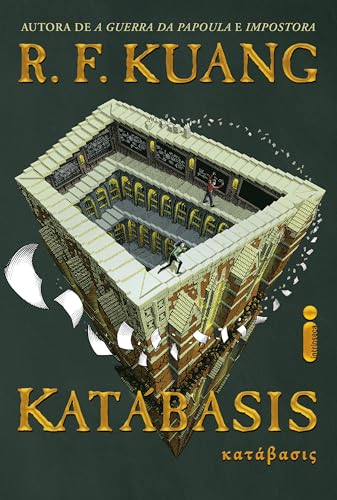Katabasis

Dante’s Inferno meets Susanna Clarke’s Piranesi in this all-new dark academia fantasy from R. F. Kuang, the #1 New York Times bestselling author of Babel and Yellowface, in which two graduate students must put aside their rivalry and journey to Hell to save their professor’s soul—perhaps at the cost of their own.
BUY THE BOOK
Join a book club that is reading Katabasis!
Community Reviews
What Bookclubbers are saying about this book
✨ Summarized by Bookclubs AI
Readers say *Katabasis* by R.F. Kuang offers a richly imaginative blend of dark academia, fantasy, and mythology with beautiful writing and immersive ...
However much graduate work can be equated with hell, it takes nearly double Kuang's less than 3 decades to fully postulate and populate all the circles of Hell. Dante wasn't all that much older, though, so he must have been rather prone to judgement and grudges. Exile will do that, I suppose.
Alice, a graduate student in Cambridge's department of analytic magick, goes to Hell to find her adviser, who exploded due to a faulty pentacle she failed to correct. Peter, her primary rival, horns in on her expedition.
Hell as presented here is more full of dangers and dullness but only a few opportunities for bitter wit. Sort of an early midlife reevaluation of priorities more than a ruthless review of wrong choices. Though there is that.
Im so disappointed in myself for wasting my time waiting for this book to get interesting. It was a college theory textbook. I was so bored it actually helped me go to bed early several days in a row. This book went through so many theories and maths (yes maths) and I honestly felt like all of it was completely unnecessary to the story. I didnt understand a lick of the theories and after 50% started skimming and only reading where there was character dialogue and I still understood the story. This book could have been half the length. Do yourself a favor, if it doesnt interest you in the first few chapters, the rest wont either.
I looooove rf kuang but this book was a miss for me. The story is definitely interesting, I liked the premise of comparing life and hell, the meaning to being alive, etc. She incorporates her usual style of blending fiction with real science/literature/linguistics. But this time the factual side of the book just didn’t make much sense tbh and didn’t feel apart of the story, more like random logic theories and philosopher references just thrown out there by these Cambridge nerds
3 because there were parts where I did not want to put the book down, but then there's parts where I wanted to skip over.
I enjoyed the ending, some of the characters, the descriptions about the shades and how their lives ended.
However the romance was boring and I didn't like Alice. Every other woman was looked down on or judged for not caring about academics enough. If I have to read the word 'statement' one more time I might start sobbing.
DNF @ 14%
Katabasis feels less like a novel and more like an academic name-dropping contest. The female lead is saddled with a “woe is me” attitude, convinced she’s the smartest person in any room, and resentful of anyone who dares to have had an easier time in life or academia. Instead of coming across as ambitious, she just feels one-dimensional, self-pitying, and exhausting. The male lead? About as compelling as lukewarm tea.
And then there’s the endless parade of writers, poets, philosophers, and literary theories about hell. But instead of enriching the story, it just feels like Kuang waving around her bibliography. Name-dropping ≠ narrative. All of this would be forgivable if there were a solid story at the heart of it, but what little plot exists feels like a side quest in service of the references.
When the writing is dry and the characters are dull, no amount of intellectual window-dressing can make it work. I tapped out early — life’s too short for a book that’s all gloss and no substance.
Katabasis feels less like a novel and more like an academic name-dropping contest. The female lead is saddled with a “woe is me” attitude, convinced she’s the smartest person in any room, and resentful of anyone who dares to have had an easier time in life or academia. Instead of coming across as ambitious, she just feels one-dimensional, self-pitying, and exhausting. The male lead? About as compelling as lukewarm tea.
And then there’s the endless parade of writers, poets, philosophers, and literary theories about hell. But instead of enriching the story, it just feels like Kuang waving around her bibliography. Name-dropping ≠ narrative. All of this would be forgivable if there were a solid story at the heart of it, but what little plot exists feels like a side quest in service of the references.
When the writing is dry and the characters are dull, no amount of intellectual window-dressing can make it work. I tapped out early — life’s too short for a book that’s all gloss and no substance.
See why thousands of readers are using Bookclubs to stay connected.